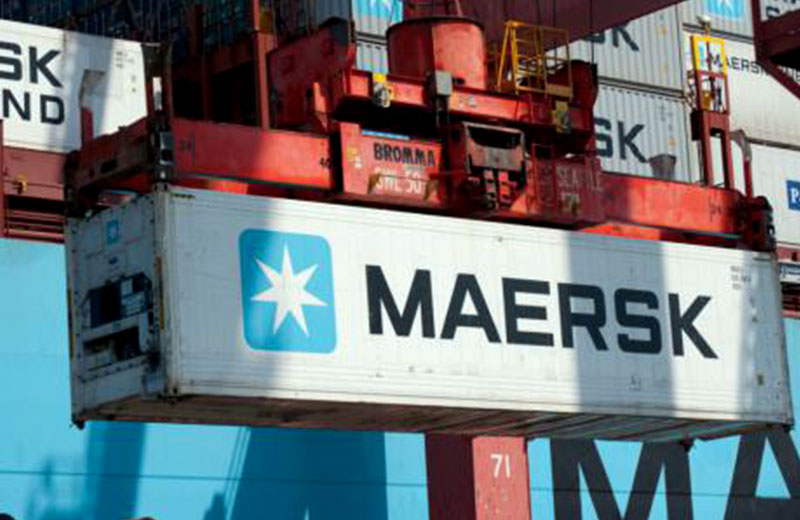A.P. Moller-Maersk has closed the first quarter of 2019 with a 33 per cent increase in earnings before interest, tax, depreciation and amortisation (EBITDA) to $ 1.2 billion while revenue grew by 2.5 per cent to $ 9.5 billion compared to Q1 2018. Operating cash flow improved significantly to $ 1.5 billion and free cash flow was $ 3.5 billion, including sale of shares in Total S.A.
“We had a good start to 2019. In Q1, revenue grew by 2.5 per cent, operating earnings improved by 33 per cent and cash flow from operations doubled to $ 1.5 billion. With a strong free cash flow of $ 3.5 billion after the sale of the remaining shares in Total S.A., we have significantly strengthened our balance sheet. Net interest-bearing debt has been reduced by $ 2.4 billion since Q4 and by $ 7.1 billion since Q1 2018,” says Mr Søren Skou, CEO of A.P. Moller-Maersk.
Profitability in Ocean segment increased. EBITDA grew 42 per cent to $ 927 million compared to the same period last year, mainly driven by a 3.9 per cent increase in average loaded freight rates and an improvement in total operating cost of 2.8 per cent. Revenue increased to $ 6.9 billion despite lower volumes which declined 2.2 per cent, impacted by the frontloading seen on the Pacific trades in Q4 2018 and weak demand on Latin America and Oceania trades.
Looking at terminal profitability, the opening of the Moin terminal, Costa Rica and positive underlying volume growth in gateway terminals had a positive impact on terminal profitability in Q1. Terminals & Towage reported an increase in revenue to $ 991 million from $ 911 million and in EBITDA to $ 267 million from $ 244 million compared to the same quarter last year.
Logistics & Services reported a decrease in revenue in Q1 2019 by 0.5 per cent to $ 1.4 billion driven by lower air freight forwarding revenue. EBITDA increased to $ 51 million from $ 45 million in Q1 2018.
Progress on transformation
The strategic transformation also progressed. In the first quarter, Maersk delivered combined synergies of $ 130 million. Cash return on invested capital (CROIC) improved to a positive 6.7 per cent from a negative 5.9 per cent, driven by higher earnings, strong cash conversion and a reduction in invested capital.
“We made good progress on the transformation, where we have completed the separation of the energy businesses, further integrated our organisation and continued to improve our product portfolio. This resulted in a solid cash return on invested capital and delivery of synergies, getting us closer to our target of $ 1 billion by end of 2019. Non-Ocean revenue and gross profit in Logistics & Services grew, but needs to accelerate in the coming quarters,” says Mr Søren Skou.
Non-Ocean revenue grew by 3.8 per cent in Q1 when adjusted for the closing of production facilities in Maersk Container Industry. Logistics & Services improved gross profit by 2.2 per cent, positively impacted by growth in intermodal and from warehouse facilities.
The return on invested capital (ROIC) improved in Q1 to a positive 1.3 per cent from negative 0.5 per cent. The long-term target of a ROIC above 7.5 per cent is reaffirmed.
Share buy-back, cash distribution and a new dividend policy
As part of the intention to distribute a material part of the value of shares received in Total S.A. in connection with the sale of Maersk Oil, the Board of Directors has decided to exercise the authority to buy back shares with a maximum value of DKK 10 billion ($ 1.5 billion). The programme will run from June 2019 and over a period of up to 15 months. After execution of the programme, the Board of Directors will evaluate the capital structure and outlook for A.P. Moller-Maersk with the intention to distribute additional cash to shareholders, subject to maintaining investment-grade rating.
Furthermore, the Board of Directors has decided a new dividend policy with an annual payout ratio of 30-50 per cent of underlying net result. The new dividend policy provides A.P. Moller-Maersk with the flexibility to adjust dividends within a range to accommodate investments needed to balance the company and grow Non-Ocean disproportionately. In the medium-term, the annual payout ratio should be expected to be at the low to mid-point of the range.
Guidance for 2019
Subject to the current risk of further restrictions on global trade and other external factors impacting freight rates, bunker prices and foreign exchange rates, A.P. Moller-Maersk has reiterated its guidance of an EBITDA of around $ 5 billion, including effects from IFRS 16.
Furthermore, guidance on CAPEX of around $ 2.2 billion and a high cash conversion is maintained with an estimated organic market growth in volumes in Ocean of 1-3 per cent for 2019, said a release.
“We reaffirm our guidance for the 2019 results. We are still facing considerable uncertainties from weaker macro numbers as well as the risk from trade tensions and implementation of IMO 2020. In Q1, volumes on trans-Pacific trade between Asia and North America have shown signs of decline and new tariffs can potentially reduce expected growth in global container volumes by up to 1 percentage point,” Mr Skou says.






